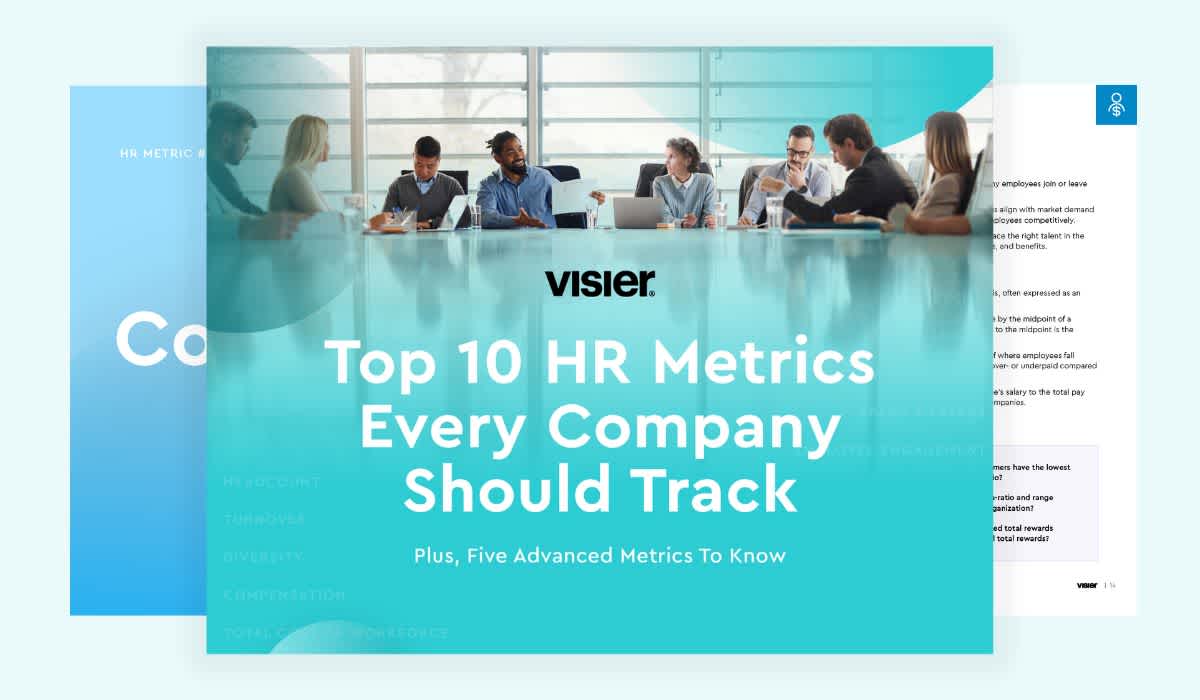Compensation Planning: What It Is and Why You Need It
Compensation planning helps to ensure that your organization is compensating employees equitably for their impact, and the market. Learn more.

Compensation is the reward you give your employees for their hard work. While it is not the primary driver of performance, it has a critical role in employee satisfaction.
Compensation planning is a process that helps you design the best compensation strategy for your organization. It examines roles, responsibilities, market conditions, policies, regulations, performance, and incentives. The goal is to create a sustainable, fair compensation plan that attracts, motivates, and retains top performers.
What is the compensation planning process in HR?
Before we talk about planning, let’s take a step back and understand compensation. You may think it is all about the salary. It’s not. Compensation is the total of the rewards given to employees, including the base salary, bonuses, health insurance, parental leave, and stock options.
The compensation planning process is usually the HR department’s responsibility. Its goal is to attract, motivate, and retain employees while also balancing the company's financial interests and goals.
Compensation planning is the process by which an organization develops a compensation strategy to help the organization meet strategic objectives, operational targets, and employee needs. It includes an analysis of the market, the budget, and each position within the company. It also considers short and long-term goals, and policies regarding succession, merit, and salary.
Why organizations need compensation planning
Compensation is a crucial element in your business. It’s not something you can just wing. Without proper compensation management and planning, you’re in for some negative surprises. For instance, 63% of employees who quit their jobs in 2021 did so due to low pay.
Planning helps you ensure you pay employees equitably. It allows you to keep an eye on the market and make sure you’re not paying people less than your competitors. It also ensures that you can proactively monitor merit rewards and other bonuses to ensure that everyone has a fair chance to receive a raise.
When you have a transparent and strong compensation plan, you attract top talent more easily. Current employees will also feel more motivated to work harder, knowing that their efforts are seen and rewarded.
Compensation planning can also help you spot more sensitive issues. For instance, many companies increase salary levels for new hires compared to those already working for them in similar positions. While the extra pay can help you attract top talent, it may also become the reason employees quit.
A Visier analysis showed that employees whose salaries were not adjusted to approximate the newest highly paid team member within 6 months resigned 1.8 times sooner compared to those whose pay was adjusted within the first month of the new person’s entry. Similarly, those who haven’t received a compensation adjustment in 12 months resigned 2.3 times sooner.
When you create a strong compensation plan, you can spot these disparities and make sure you reward tenured employees too, not just new ones.

5 benefits of a strong compensation plan
A strong compensation plan is the key to a productive workforce, low voluntary attrition rates, and high performers. Here are five remarkable benefits.
It improves motivation. Employee motivation has many drivers. And one of them is compensation. When people feel they’re fairly rewarded for their work, they’re more likely to perform their best.
It helps attract and retain top talent. Many companies are facing challenges when trying to attract new talent. Competitive salaries can be a crucial factor when people choose a new job. Similarly, fair pay, bonuses, and merit increases will motivate top talent to stay with the company longer.
It combats discrimination. Wage gaps due to gender, race, or other demographic factors should be a thing of the past. But if you’re not careful, mistakes might fall through the cracks. A strong compensation plan safeguards against discrimination, promoting DEIB.
It guarantees compliance with legal requirements. Labor laws, regulations, and standards can vary from state to state and country to country. If you have an international team with remote workers, things can get even more complicated. Compensation planning allows you to stay on top of all these issues and comply with all the applicable laws and regulations.
Cost control. Without a compensation plan, you could pay your staff too little and end up losing valuable people. But you could also fall into the other extreme—paying too much, giving bonuses left and right, and ending up with a hole in your budget. Compensation planning ensures fair and competitive wages without draining resources.
5 elements of compensation
There are five key components to compensation. Each has a well-defined role and can boost employee performance, satisfaction, motivation, and retention.
Compensation (salary). This is the direct compensation or the base salary an employee gets for their work. It can also come as hourly pay, depending on the sector, and may include tips and financial bonuses.
Development opportunities. A lack of growth opportunities is one of the top reasons employees quit their jobs. That’s why L&D programs should be part of the compensation package you offer. This will also help you create a simple, yet effective strategy that will help both the company and the employees grow and improve.
Benefits and perks. Sick days, paid vacation, insurance, and pension are all benefits you should consider. Don’t forget that different countries could have different laws that dictate the amount of time off, and the specific benefits that employees are entitled to.. Adjust accordingly so that you are compliant, but also offer a package that is attractive to all employees, regardless of their location.
Recognition. Have you ever done great work only for it to go seemingly unnoticed? You’re not alone. Insufficient recognition has been and still is one of the top struggles for many employees and one that can drive them to seek other opportunities. Make sure merit rewards and other similar bonuses are part of your compensation plan.
Well-being. A work-life balance should be more than a buzzword. Healthy employees are more productive. That’s why well-being packages should be part of compensation. These can include gym memberships, mental care plans, access to stress reduction apps and workshops, and more.

What are the objectives of compensation planning?
Before you can start creating your compensation strategy, you need to get clear on your goals. You’ll also need an effective way to measure your achievements.
Ideally, each goal will be measurable with one or more HR metrics. Compensation planning objectives can vary from company to company, but a few critical ones include:
Aligning compensation with the company’s business strategy, its operational goals, and the market.
Boosting productivity and motivation.
Improving your team’s well-being by allowing them to focus on their physical and mental health and making sure they have a real work-life balance.
Ensuring fair and equitable compensation for everyone.
Decreasing voluntary turnover.
Attracting top talent to join the company.
5 steps in compensation planning
Compensation plans require data analysis and stakeholder collaboration. Here are some common steps you’ll need to take.
1. Job evaluation
Two jobs may sound similar, but that doesn’t mean they’re exactly the same. A copywriter in one company could be tasked with writing ad and email campaigns, while in another they may write case studies, interviewing SMEs, and more.
Understand the different responsibilities, requirements, and the value each position brings to the company. Seniority is another factor you’ll need to consider. Senior positions will most likely have different responsibilities than junior ones and will come with higher pay.
2. Market analysis
Companies that compensate employees without first analyzing the market won’t get far. The compa-ratio, a percentage that compares the salary of an employee to the median pay for a similar position within the company or external market, is critical here.
Start by gathering data on compensation practices and understand trends within the industry and in your region.
Don’t forget to look beyond the job title. Include your findings from the previous step—the job evaluation—to get a clear picture of the market average.
3. Analyze internal compensation data
Once you have a clear view of the market and the job evaluations, it’s time to look at your own data. Where do you stand compared to the market? Do you spot any big inequalities in similar positions?
Don’t forget to compare the jobs in the company with each other, not just with those in other companies. Try to see if there are any wage gaps between people in similar positions and similar seniority. Those are the wages you will need to adjust sooner rather than later.
4. Budget and financial analysis
You can’t plan compensation without first looking at the company’s budget. What resources are available and how can you best allocate them to create a strategic compensation strategy?
Don’t forget to look beyond the salary. If you want to keep your employees happy, you’ll need to think of merit increases and other bonuses. Plus, there are other benefits, such as insurance, parental leave, and more. Include all these different factors in your plan and ensure everything is aligned with the company’s budget.
5. Compensation structure and salary ranges
What will make up your compensation? What incentives do you want to offer on top of the base salary? And what bonuses and perks do you think will be more useful to your employees?
If your budget allows it, plan for some flexibility. For instance, employees in their 20s and 30s might be more interested in parental leave and perks like gym memberships. Those in their 50s might be happier to know they have a good pension plan.
Next, you’ll need to create salary ranges. This helps ensure pay equity among employees in similar positions and similar seniority. It is also a great step towards more pay transparency, a requirement that’s becoming more and more important to employees.
6. Monitor the plan and make adjustments as needed
Compensation is not a one-and-done deal. You’ll need to keep an eye on your goals, the budget, and the market. Gather feedback from managers, and the employees themselves, and constantly look for opportunities to improve your compensation strategy.
Compensation planning can make the difference between a successful company that attracts and retains talent with ease and has a productive workforce and one that fails to attract, motivate, and retain top talent. Starting this journey can feel challenging. There’s so much data to look at and so many factors to consider.
Visier Smart Compensation can take some of the pressure off of your shoulders. You don’t need to wander around trying to figure out what’s working and what isn’t. Base all compensation decisions on data and create a transparent plan that rewards everyone fairly and equitably.
On the Outsmart blog, we write about workforce-related topics like what makes a good manager, how to reduce employee turnover, and reskilling employees. We also report on trending topics like ESG and EU CSRD requirements and preparing for a recession, and advise on HR best practices like how to create a strategic compensation strategy, metrics every CHRO should track, and connecting people data to business data. But if you really want to know the bread and butter of Visier, read our post about the benefits of people analytics.



